Disability Royal Commission news and updates
Disability Royal Commission news and updates
The Royal Commission into Violence, Abuse, Neglect and Exploitation of People with Disability was established in April 2019 to investigate concerns about the treatment of people with disability across Australia.
The investigation will cover the experiences of people with disability in all environments, including schools, workplaces, jails and detention centres, secure disability and mental health facilities, group homes or boarding houses, family homes, hospitals and day programs.
This page is a collection of our articles about previous hearings, reports and recommendations, with news of the latest hearings and announcements appearing at the top.
The expected upcoming public hearing dates are:
- 13-17 February: Public hearing 32, Brisbane – Service providers revisited
Commissioners will collect evidence for their investigation by hearing directly from people with disability, families, disability advocates, service providers and Government bodies and accepting submissions in a range of accessible formats.
To share your experiences in a way that suits you visit the Disability Royal Commission’s website.
The Commission is expected to run until September 2023, when a report will be made to the Australian Government recommending changes to policies, laws, systems and practices which will improve the lives of people with disability.
Please note that many of the articles below contain stories of abuse and violence.
Popular Disability Royal Commission News And Updates Articles
Disability service providers have been in the spotlight this week as the Royal Commission returned for the first time this year to examine whether providers are protecting people with disability from violence, abuse and neglect.
The Royal Commission into Violence, Abuse, Neglect and Exploitation of People with Disability has sat for its 31st and final public hearing of 2022, concluding the year with discussions on a Vision for an inclusive Australia. Held in Brisbane, the public hearing tackled a range of issues and perspectives to assist with understanding how to create a more inclusive society for people with disability.
The Royal Commission into Violence, Abuse Neglect and Exploitation of People with Disability has finished sitting for its 30th public hearing, having met to discuss concerns around guardianship, and substituted and supported decision-making. It examined the personal experiences of people with disability who have been placed under guardianship or administration orders for healthcare, financial and other day-to-day matters.
The Royal Commission into Violence, Abuse, Neglect and Exploitation of People with Disability has heard that people with cultural backgrounds who live with disability often experience isolation and abuse from within their communities, as well as feel frustrated when accessing the National Disability Insurance Scheme (NDIS).
People with disability are frequently experiencing abuse and harassment in public and online with few avenues to seriously address the matter, the Royal Commission into Violence, Abuse, Neglect & Exploitation of People with Disability has heard this week. The 28th public hearing focused on Violence against and abuse of people with disability in public places, including on the internet.
The criminal justice system is not accommodating for people with disability with several experts and people with disability sharing their experiences with the Royal Commission into Violence, Abuse, Neglect & Exploitation of People with Disability this week. The Disability Royal Commission investigated ‘Conditions in detention in the criminal justice system’, including the violence and neglect of young people with disability in youth detention and the high rates of incarceration for First Nations people with disability.
People with disability have told the Royal Commission into Violence, Abuse, Neglect and Exploitation of People with Disability that despite spending almost all of their income on housing they have experienced inaccessible and unlivable conditions. This week’s public hearing focused on ‘Homelessness, including experience in boarding houses, hostels and other arrangements’, and witnesses told the Commission of their stress around being at risk of homelessness, as well as in some cases experiencing abuse from service providers.
The National Disability Insurance Scheme (NDIS) is not trusted by First Nations people with disability or supporting this group appropriately, hears the Royal Commission into Violence, Abuse, Neglect and Exploitation of People with Disability. A theme of public hearing 25 – ‘The operation of the NDIS for First Nations people with disability in remote and very remote communities’ – was a lack of trust for the NDIS and the National Disability Insurance Agency (NDIA) that runs the scheme.
Representatives of the South Australian and Western Australian Education Departments have admitted they need to work on supporting students with disability, after hearing about students’ experiences. Public Hearing 24 of the Royal Commission into the Violence, Abuse, Neglect and Exploitation of People with Disability concluded 10 June.
Young people with disability and parents have shared their experiences of segregation in the education system during the 24th public hearing of the Royal Commission into Violence, Abuse, Neglect and Exploitation of People with Disability. To date the Royal Commission has received 4,677 submissions, of which 21 percent relate to education or learning for children and young people with disability, prompting the Commission to hold another hearing into the issues around education.
The Royal Commission into Violence, Abuse, Neglect and Exploitation of People With Disability heard this week that people working in Australian Disability Enterprises (ADEs) are paid a fraction of the minimum wage and often remain in supported employment for years. Public hearing 22, The experience of people with disability working in Australian Disability Enterprises, ran from 11 to 13 April and focused on the experiences of people working in ADEs, wage assessments, supported wage levels and the relationship to the Disability Support Pension (DSP), and the training and development opportunities offered.
The Royal Commission into the Violence, Abuse, Neglect and Exploitation of People with Disability has heard from girls and women with disability about their constant barriers to accessing help and receiving justice for abuse and violence towards them. Part two of Public Hearing 17: the experience of women and girls with disability with a particular focus on family, domestic and sexual violence, began on Monday and witnesses, advocates and service representatives appeared in front of the Commission across the week to provide their lived experiences.
A case study heard by the Royal Commission into Violence, Abuse, Neglect and Exploitation of People with Disability has shown gaps in employment support and poor handling of complaints. Public Hearing 21 focused on the experience of people with disability engaging with Disability Employment Services (DES) and in particular the experiences of Mzia*, who worked as a barista trainer in a program known as BusyBeans.
The Royal Commission into Violence, Abuse, Neglect and Exploitation of People with Disability has released a statement outlining its ongoing concern about the health, safety and wellbeing of people with disability during the current Omicron wave of the COVID-19 pandemic. The Commission says in the statement that it is deeply concerned that people with disability are still not being appropriately prioritised in health care, disability support and the vaccine and booster rollout.
The Board of peak advocacy organisation People with Disability Australia (PWDA) says the “failure” of Australian governments to keep people with disability safe during the latest COVID-19 wave should be investigated by the Royal Commission into the Violence, Abuse, Neglect and Exploitation of People with Disability.
Employment rates of people with disability in Australia have not seen improvement in 30 years, an expert told the Royal Commission into Violence, Abuse, Neglect and Exploitation of People With Disability this week. The Royal Commission has been investigating the challenges faced by people with disability in finding and retaining employment in the latest round of public hearings.
The latest Royal Commission into Violence, Abuse, Neglect and Exploitation of People with Disability public hearing has outlined how Australia is not protecting the rights of people with disability, in line with a “shocking” report on the use of restraints.
Ninety percent of Australian women with intellectual disability have experienced sexual abuse according to figures heard by the Royal Commission into Violence, Abuse, Neglect and Exploitation of People with Disability this week. The first part of the Commission’s Public Hearing 17 on the experiences of women and girls with disability, which had a particular focus on family, domestic, and sexual violence, was held on 13 – 14 October.
Australia’s COVID-19 vaccine rollout has been labelled “seriously deficient” by the Royal Commission into Violence, Abuse, Neglect and Exploitation of People with Disability. The Commission has released a draft report, called Report of Public hearing 12: The experiences of people with disability, in the context of the Australian Government’s approach to the COVID-19 vaccine rollout, based on its hearings held in May.
People with a disability now have their confidentiality protected by law for their entire lifetime once they submit to the Royal Commission into Violence, Abuse, Neglect and Exploitation of People with Disability. Advocates in the sector have been calling for the law to strengthen protection of people with disability as previously the confidentiality of a person who submitted only applied during the Commission, and not after the Commission ended.
A South Australian family has told the Royal Commission into Violence, Abuse, Neglect and Exploitation of People with Disability they were sent an anonymous letter threatening abuse against their nephew, who lives with an intellectual disability. The Disability Royal Commission is continuing to look into how disability service providers prevent and respond to violence, abuse, neglect and exploitation as part of a week-long hearing in Adelaide.
The Royal Commission into Violence, Abuse, Neglect and Exploitation of People with Disability (Disability Royal Commission) last week turned its focus to National Disability Insurance Scheme (NDIS) service providers, hearing allegations of abuse and mistreatment that occurred in a Sydney group home.
The Royal Commission into Violence, Abuse, Neglect and Exploitation of People with Disability held a special hearing on Monday investigating the COVID-19 vaccine rollout to disability residents and staff and its performance in the disability sector. The Department of Health admitted at a Senate Select Committee hearing in April that disability residents were de-prioritised so they could vaccinate all aged care residents instead.
The Royal Commission into Violence, Abuse, Neglect and Exploitation of People with Disability has been granted a 17-month extension by the Australian Government. With the final report now due on 29 September 2023 there will be additional time for further hearings, which has been welcomed by disability advocacy groups.
Following a tumultuous national rollout of the COVID-19 vaccine, the Royal Commission into Violence, Abuse, Neglect and Exploitation of People with Disability will be examining the Australian Government’s approach to vaccinating Australia’s most at risk. A one day hearing will be held on 17 May by the Disability Royal Commission, looking into the success of the vaccine rollout for the disability sector, including the vaccination of people with disability and disability support workers.
Disability advocacy groups are demanding that the Federal Government responds to requests from the Disability Royal Commissioner Ronald Sackville AO QC to extend the Royal Commission into Violence, Abuse, Neglect and Exploitation of People with Disability (DRC), with the initial request being largely ignored since October last year. Advocates believe the extension is essential and have joined forces in their call for the additional 17 months to be granted so that the stories of people with disability can be heard.
As Australia deals with the ongoing sexual assault cases against women in Parliament and the pervasive culture around sexual assault by men, the Disability Royal Commission released a damning report, finding that women with disability are twice as likely to experience sexual assault than women without disability.
People with disability and representative organisations are calling on the Australian Government to pass legislation to protect the confidentiality of people giving information to the Disability Royal Commission when Parliament sits this week.
The Disability Royal Commission wants to hear about challenges, barriers and ways to better prevent and reduce violence against, and abuse, neglect and exploitation of, culturally and linguistically diverse people with disability. In its latest issues paper released this week, the Royal Commission calls for information and feedback from members of the public, particularly people with disability from culturally and linguistically diverse backgrounds.
Indefinite detention and the overrepresentation of people with cognitive disability in the criminal justice system will be examined when the Disability Royal Commission holds its next public hearing in Brisbane from 16-25 February, 2021. This hearing will consider the need for the provision of proper supports to people with disability in detention.
Disability rights and advocacy organisations are calling upon the Disability Royal Commission to fully investigate the negative impacts of segregation on people with disability. Over 40 organisations have released a joint segregation paper outlining their concerns about existing law, policy and practice frameworks that maintain the segregation of people with disability from community life.
Pathways and barriers to open employment for people with disability is the subject of the ninth public hearing of the Royal Commission into Violence, Abuse, Neglect and Exploitation of People with Disability to be held in Sydney this week. It will be the first public hearing of the Royal Commission concerning economic participation of people with disability.
The Australian Government was responsible for “serious failures” to people with disability during the early stages of the COVID-19 pandemic in Australia, a report by the Disability Royal Commission says. The report was released on 30th November in response to the Disability Royal Commission’s fifth public hearing held in August.
First Nations people with disability will tell the Disability Royal Commission this week about the structural violence they experience in the child-protection system around Australia.
The Royal Commission into Violence, Abuse, Neglect and Exploitation of People with Disability held hearings, running from 22 – 25 September, examining the use of psychotropic medication to address behaviours of concern exhibited by people with disability.
The Royal Commission into Violence, Abuse, Neglect and Exploitation of People with Disability started its first round of hearings for 2020 in Homebush, Sydney, with a focus on how people with intellectual disability experience the healthcare system. Over the two week hearing, the Commission will be investigating access and treatment of people with a cognitive disability, including intellectual disability, autism and acquired brain injury, in the health system.
The last three days of the Royal Commission into the Violence, Abuse, Neglect and Exploitation of People with Disability, heard from advocacy organisations about group homes, a case study around sexual abuse in a group home, and a panel suggesting alternatives to group homes. Many of the witnesses explained the difficulty of living within group homes and the lack of freedom and independence they had as individuals.
The final two days of the education hearings in Brisbane for the Royal Commission into Violence, Abuse, Neglect and Exploitation of People with Disability heard from department heads of inclusive and special education services, and the Department of Education’s role in driving inclusive education in Queensland. On day three, a panel of special education department heads discussed the success of inclusive education in their schools in Queensland.
The Royal Commission into Violence, Abuse, Neglect and Exploitation of People with Disability has officially opened its public submissions. The inquiry is fielding the lived experience of people with disability and hopes to uncover incidents of violence, neglect, abuse or exploitation of people with disability, understand the current complaints processes and outcomes, the lack of access to support or services, the quality of disability support services and examples of best practice and innovation.
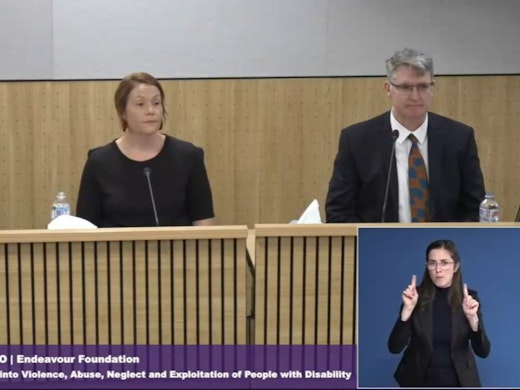
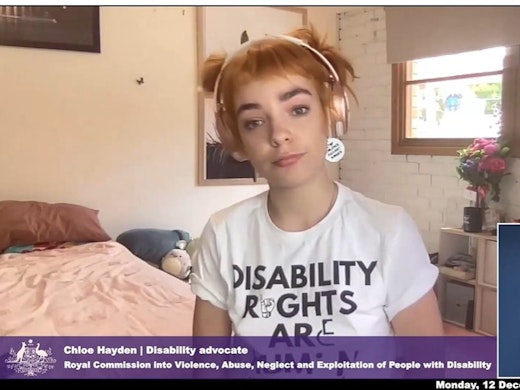
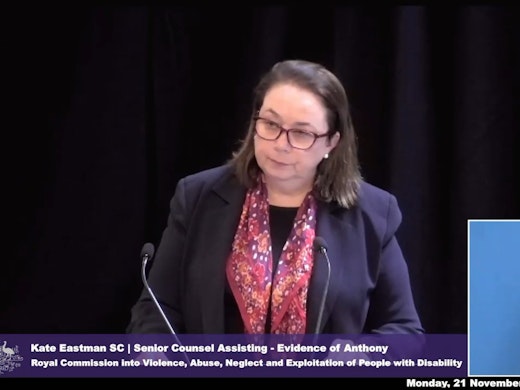
![Esther Simbi is a refugee, disability advocate and social worker who spoke at the Commission. [Source Royal Disability Commission]](https://agedcareguide-assets.imgix.net/news/articles/28_10_22-RC.jpg?fm=pjpg&w=520)
![Carly Findlay spoke of the importance of online visibility for people with disability at the Disability Royal Commission. [Source: Twitter]](https://agedcareguide-assets.imgix.net/news/articles/14_10_22_DRC.jpg?fm=pjpg&w=520)
![Dianne Lyons has muscular dystrophy and spoke of her experiences while in prison. [Source: Livestream]](https://agedcareguide-assets.imgix.net/news/articles/23_9_22_royal_commission.jpg?fm=pjpg&w=520)
![The Disability Royal Commission heard from people with disability who experienced homelessness and those who experienced abuse in Supported Residential Services. [Source: Disability Royal Commission]](https://agedcareguide-assets.imgix.net/news/articles/2_9_2022-homeless-DRC.jpg?fm=pjpg&w=520)
![Deputy CEO June Reimer of the First Peoples Disability Network (FPDN) says remote and regional First Nations people have not been considered in the design of the NDIS. [Source: Disability RC]](https://agedcareguide-assets.imgix.net/news/articles/15_7_2022-DRC-First-Nations.jpg?fm=pjpg&w=520)
![Commissioners questioned representatives of the South Australian and Western Australian Education Departments during Public Hearing 24. [Source: Disability Royal Commission]](https://agedcareguide-assets.imgix.net/news/articles/10_6_2022-commissioners.jpg?fm=pjpg&w=520)
![During the Royal Commission's latest hearing Senior Counsel Assisting Kate Eastman has been asking questions of lived and direct experience witnesses. [Source: Disability Royal Commission]](https://agedcareguide-assets.imgix.net/news/articles/7_6_2022-commission.jpg?fm=pjpg&w=520)
![National Disability Services Head of Employment Kerrie Langford told the Disability Royal Commission the organisation has a vision for change in ADEs. [Source: Disability Royal Commission]](https://agedcareguide-assets.imgix.net/news/articles/14_4_2022-commission-ADE.jpg?fm=pjpg&w=520)
![Senior Counsel Assisting, Kate Eastman, appeared for Public Hearing 17 in front of artwork submitted by women with disability who experienced domestic violence. [Source: Disability Royal Commission]](https://agedcareguide-assets.imgix.net/news/articles/1_4_2022-commission-violence.jpg?fm=pjpg&w=520)
![Public Hearing 21 of the Disability Royal Commission focused on a case study of a Disability Employment Service and participant. [Source: Disability Royal Commission]](https://agedcareguide-assets.imgix.net/news/articles/25_2_2022-royal-commission.jpg?fm=pjpg&w=520)
![The Disability Royal Commission says there are gaps in the Government's plans to protect people with disability from COVID-19. [Source: Shutterstock]](https://agedcareguide-assets.imgix.net/news/articles/17_2_2022-royal-commission-concern.jpg?fm=pjpg&w=520)
![The newest pandemic wave caused by the Omicron variant is causing widespread health, safety and accessibility issues for Australians with disability. [Source: Shutterstock]](https://agedcareguide-assets.imgix.net/news/articles/21_1_2022-Omicron-commission.jpg?fm=pjpg&w=520)
![The Royal Commission has been investigating the challenges faced by people with disability in finding and retaining employment in the latest public hearing. [Source: Disability Royal Commission]](https://agedcareguide-assets.imgix.net/news/articles/26_11_2021-royal-commission-high.jpg?fm=pjpg&w=520)
![An NDIS Commission spokesperson says the increased volume of unauthorised restricted practices is “completely unacceptable”. [Source: Shutterstock]](https://agedcareguide-assets.imgix.net/news/articles/10_11_2021-rights-and-restraints.jpg?fm=pjpg&w=520)
![Senior Counsel Assisting the Disability Royal Commission Kate Eastman SC says preventing violence against women with disability will require systemic change. [Source: Disability Royal Commission]](https://agedcareguide-assets.imgix.net/news/articles/14_10_2021-Roya-Commission-high.jpg?fm=pjpg&w=520)
![Disability Royal Commission Chair Ronald Sackville has been involved in a draft report labelling the Australian COVID-19 vaccine rollout as "seriously deficient". [Source: Disability Royal Commission]](https://agedcareguide-assets.imgix.net/news/articles/30_9_2021-royal-commission-high.jpg?fm=pjpg&w=520)
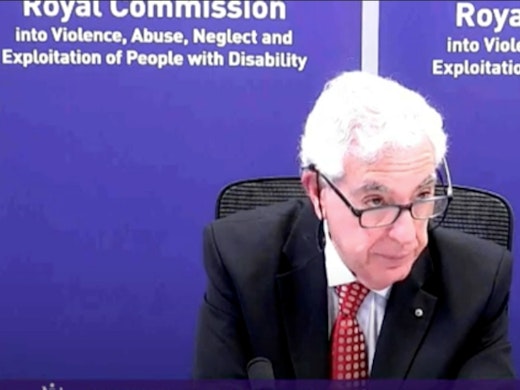
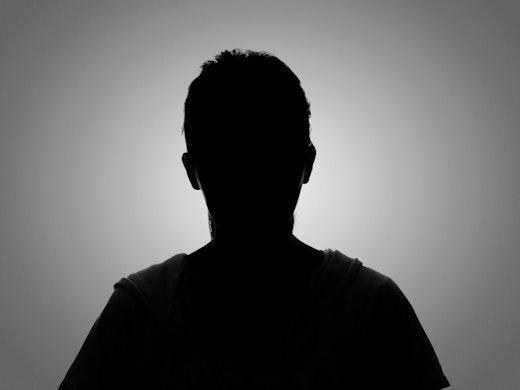
![Sunnyfield Disability Services CEO Caroline Cuddihy fronted the disability royal commission over three days last week. [Source: Disability Royal Commission]](https://agedcareguide-assets.imgix.net/news/articles/31_5_21-DRC-Public-Hearing-13.jpg?fm=pjpg&w=520)
![Counsel Assisting Kate Eastman SC grilled Department of Health official over disability resident de-prioritisation in vaccine rollout [Source: Supplied]](https://agedcareguide-assets.imgix.net/news/articles/18_5_2021-DRC-Vaccine-Rollout.jpg?fm=pjpg&w=520)
![The Disability Royal Commission has been granted a 17-month extension. [Source: Disability Royal Commission]](https://agedcareguide-assets.imgix.net/news/articles/17_5_2021-DRC-Extension.jpg?fm=pjpg&w=520)
![The Disability Royal Commission will be investigating the effectiveness of the COVID-19 vaccine rollout for people with disability. [Source: iStock]](https://agedcareguide-assets.imgix.net/news/articles/DRC-covid-vaccine-hearing-3_5_2021.jpg?fm=pjpg&w=520)
![Disability advocates are calling on the Government to hurry up and respond to requests to extend the Disability Royal Commission. [Source: iStock]](https://agedcareguide-assets.imgix.net/news/articles/DRC-extension-23_4_2021.jpg?fm=pjpg&w=520)
![This study also uncovered alarming statistics around the violence and abuse people with disability experience over their lifetime. [Source: iStock]](https://agedcareguide-assets.imgix.net/news/articles/Sexual-assault-n-disability-25_3_2021.jpg?fm=pjpg&w=520)
![Currently, people providing written submissions to the Disability Royal Commission are only guaranteed confidentiality until the Royal Commission concludes in April 2022. [Source: iStock]](https://agedcareguide-assets.imgix.net/news/articles/DRC-privacy-legislation-15_3_2021.jpg?fm=pjpg&w=520)
![The Royal Commission encourages responses to its latest issues paper by 11 June 2021.[Source: Disability Royal Commission]](https://agedcareguide-assets.imgix.net/news/articles/126077256_395633768471120_4268017297315394496_o.jpg?fm=pjpg&w=520)
![The next Disability RC will examine factors which can contribute to people with cognitive disability cycling in and out of the criminal justice system. [Source: Disability RC]](https://agedcareguide-assets.imgix.net/news/articles/royal-commish.jpg?fm=pjpg&w=520)
![Rights and advocacy organisations are urging the Disability Royal Commission to recognise that segregation of people with disabilities is discrimination and a breach of human rights . [Source: iStock]](https://agedcareguide-assets.imgix.net/news/articles/iStock-519995449-1.jpg?fm=pjpg&w=520)
![The Royal Commission expects to hear from people with disability about their experiences in seeking open employment at the next public hearing. [Source: iStock]](https://agedcareguide-assets.imgix.net/news/articles/iStock-1187804916-1.jpg?fm=pjpg&w=520)
![RC report finds communication failed between decision-makers and people with disability, leaving them feeling “forgotten and ignored” during early stages of COVID-19. Source [iStock]](https://agedcareguide-assets.imgix.net/news/articles/iStock-1173046744-1.jpg?fm=pjpg&w=520)
![Senior Counsel Assisting Lincoln Crowley speaks at the Disability Royal Commission‘s eighth public hearing in Brisbane [Source: Disability RC]](https://agedcareguide-assets.imgix.net/news/articles/Screen-Shot-2020-11-23-at-12.07.13-pm_201123_014025.jpg?fm=pjpg&w=520)
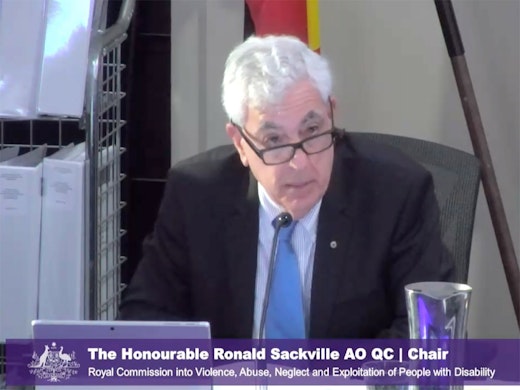
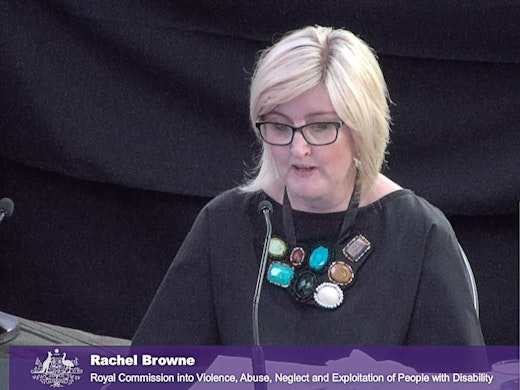
![At the Disability Royal Commission, CEO of VALID, Kevin Stone, and disability advocate, Alan Robertson. [Source: Disability Royal Commission]](https://agedcareguide-assets.imgix.net/news/articles/Screen-Shot-2019-12-09-at-5.02.01-pm.png?fm=png&w=520)
![Loren Swancutt, Head of Inclusive Schooling at Thuringowa State High School, believes mainstream schools can provide education to every child with disability. [Source: Disability Royal Commission]](https://agedcareguide-assets.imgix.net/news/articles/Screen-Shot-2019-11-08-at-4.11.57-pm.png?fm=png&w=520)
